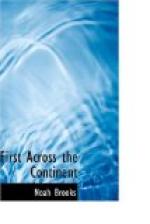But the story-teller should not forget to mention that hardy and adventurous explorer, Jonathan Carver. This man, the son of a British officer, set out from Boston, in 1766, to explore the wilderness north of Albany and lying along the southern shore of the Great Lakes. He was absent two years and seven months, and in that time he collected a vast amount of useful and strange information, besides learning the language of the Indians among whom he lived. He conceived the bold plan of travelling up a branch of the Missouri (or “Messorie"), till, having discovered the source of the traditional “Oregon, or River of the West,” on the western side of the lands that divide the continent, “he would have sailed down that river to the place where it is said to empty itself, near the Straits of Anian.”
By the Straits of Anian, we are to suppose, were meant some part of Behring’s Straits, separating Asia from the American continent. Carver’s fertile imagination, stimulated by what he knew of the remote Northwest, pictured that wild region where, according to a modern poet, “rolls the Oregon and hears no sound save his own dashing.” But Carver died without the sight; in his later years, he said of those who should follow his lead: “While their spirits are elated by their success, perhaps they may bestow some commendations and blessings on the person who first pointed out to them the way.”
Chapter II — Beginning a Long Journey
In 1803, availing himself of a plausible pretext to send out an exploring expedition, President Jefferson asked Congress to appropriate a small sum of money ($2,500) for the execution of his purpose. At that time the cession of the Louisiana Territory had not been completed; but matters were in train to that end, and before the expedition was fairly started on its long journey across the continent, the Territory was formally ceded to the United States.




